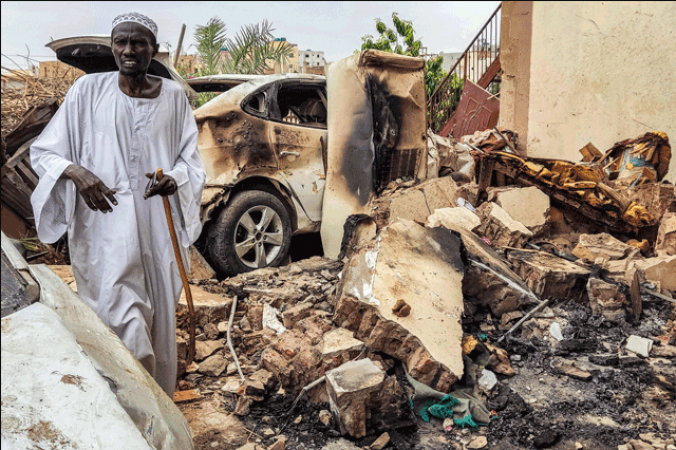
Khartoum: Witnesses claimed that fighting erupted in Khartoum, the war-torn capital of Sudan, on Tuesday, and residents of a Nile island claimed to be "under siege" due to severe food shortages.
Abdel Fattah Al-Burhan, the commander of the army, is at odds with Mohamed Hamdan Dagalo, his former deputy and the leader of the potent paramilitary Rapid Support Forces, after eight weeks of combat.
Witnesses once more reported "the sound of heavy artillery fire" in northern Khartoum, despite numerous ceasefires being broken, which provided only momentary respite for city residents.
Also Read: Quebec issues new evacuation orders as dozens of wildfires in Canada continue to burn out of control
Additionally, witnesses claimed that "clashes with various types of weapons" occurred in south Khartoum, where "the sound of explosions shook our walls."
The island of Tuti is "under total siege" by RSF forces in the city's centre, at the meeting of the White Nile and Blue Nile rivers, according to resident Mohammed Youssef.
The only bridge leading to the island has been closed off by paramilitaries, preventing residents from travelling by boat to other areas of the city.
Youssef said, "We can't transport anyone who is ill to hospitals off the island. Food will run out in stores if this continues for days.
Also Read: Unions' last-ditch efforts to oppose raising the retirement age are met with protests in France
According to the Armed Conflict Location and Event Data Project, more than 1,800 people have died since the fighting started on April 15.
The warring parties had resumed indirect ceasefire negotiations in Jeddah on Tuesday, according to the Al Arabiya channel.
According to the UN, there have been internal and external displacements totaling more than one million and a half people.
The situation is getting worse for those who are still in Khartoum and the western part of Darfur, which together have experienced the worst of the fighting.
The International Federation of Red Cross and Red Crescent Societies warned that "we are facing a massive humanitarian crisis that is only going to get worse with the collapse of the economy and collapse of the health care system."
Also Read: Donald Trump's opponent Mike Pence will begin his presidential campaign in Iowa
With "the rapidly approaching flood season and the looming hunger crisis and disease outbreaks that now are becoming more inevitable," the danger will increase.
The annual rainy season in Sudan starts in June, and doctors have repeatedly warned that it could render some areas of the nation inaccessible, increasing the risk of waterborne illnesses like malaria and cholera